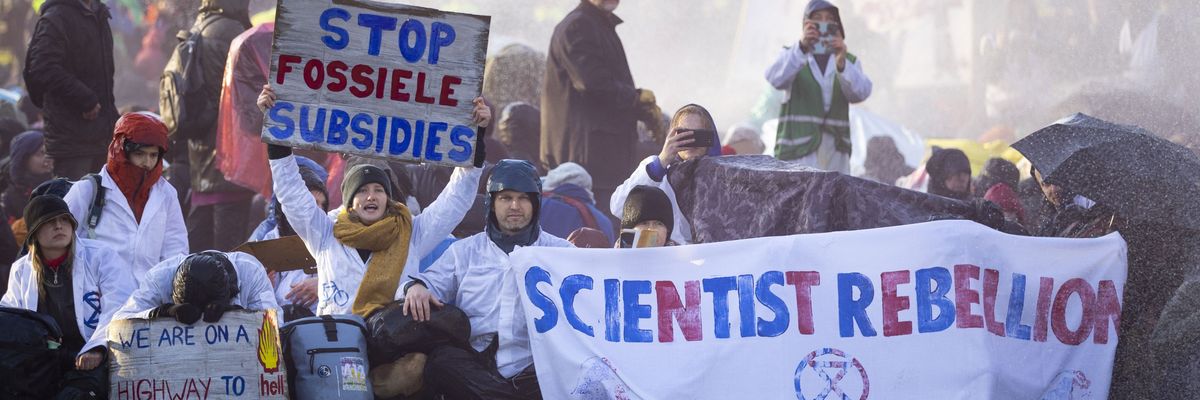The trillions of dollars in public subsidies that governments around the world hand to the fossil fuel industry each year are facing growing scrutiny from lawmakers and climate campaigners as heatwaves across the planet push global temperatures into
uncharted territory.
Environmentalist Annie Leonard, the former executive director of Greenpeace USA,
called on members of the U.S. Congress to reject public subsidies for the oil and gas industry in the must-pass annual budget package, a sweeping measure that typically includes billions in tax incentives and other handouts that encourage production and consumption of planet-warming fossil fuels.
"Stop giving our money to the corporations cooking the planet," Leonard wrote on Twitter Tuesday, urging Americans to contact and pressure their representatives.
The International Monetary Fund
estimates that world governments dished out nearly $6 trillion in total fossil fuel subsidies in 2020—around $11 million per minute—and that such giveaways are expected to grow in the coming years without significant reforms.
Last year,
according to the International Energy Agency, fossil fuel consumption subsidies alone rose to more than $1 trillion worldwide—a surge fueled in part by the energy market chaos caused by Russia's invasion of Ukraine. While such subsidies were aimed at shielding consumers from high gas prices, they had the "adverse effect of keeping fossil fuels artificially competitive with low-emissions alternatives," IEA said.
The same year that subsidies skyrocketed to record levels, the global fossil fuel industry raked in a
staggering $4 trillion in profits, the IEA found.
"Big Oil companies are boosting profits and shareholder distribution while our climate suffers," U.S. Rep. Ro Khanna (D-Calif.)
said last month.
In late 2021, 197 countries including the U.S. and Canada signed a
climate pact that contains a pledge to phase out "inefficient fossil fuel subsidies." But as Emily Atkin and Arielle Samuelson wrote in the HEATED newsletter earlier this year, that promise turned out to be "meaningless" given the subsequent rise in oil and gas subsidies.
"This is why climate promises never come to pass," Atkin and Samuelson argued. "The polluters' pocketbooks are government-lined."
Amid a catastrophic wildfire season that has blanketed large swaths of the U.S. with
toxic smoke, the Canadian government is reportedly expected to release a policy this month aimed at cutting off "inefficient fossil fuel subsidies," echoing the language of the Glasgow climate pact.
But advocates raised concerns about how the policy will define "inefficient." As the
CBC's Benjamin Shingler reported last week, climate campaigners say "subsidies should only be considered 'efficient'—and therefore an acceptable form of government funding—if they align with Canada's Paris agreement goals."
"That means subsidies shouldn't support new or updated fossil fuel infrastructure, or delay the transition to renewables, according to signatories of the letter to [Canadian Prime Minister Justin] Trudeau last month," Shingler added.
Trudeau and other world leaders will have a major opportunity to finally take concrete, coordinated action to end fossil fuel subsidies at COP28 in late November—but that would mean confronting an industry that will have a significant presence at the critical summit in the United Arab Emirates.
Chido Muzondo, a policy adviser at the International Institute for Sustainable Development, wrote last month that governments at COP28 must do more than pay "lip service to the existing pledges—made in the Paris Agreement Article 2.c.1 and in the Glasgow statement—to stop subsidizing fossil fuels."
"This decade is decisive in our fight against global warming, and time is limited to align our actions with the measures needed to avoid the worst effects of climate change," Muzondo wrote. "Fossil fuel subsidies stand out as some of the most harmful policies hindering our efforts to tackle climate change."
